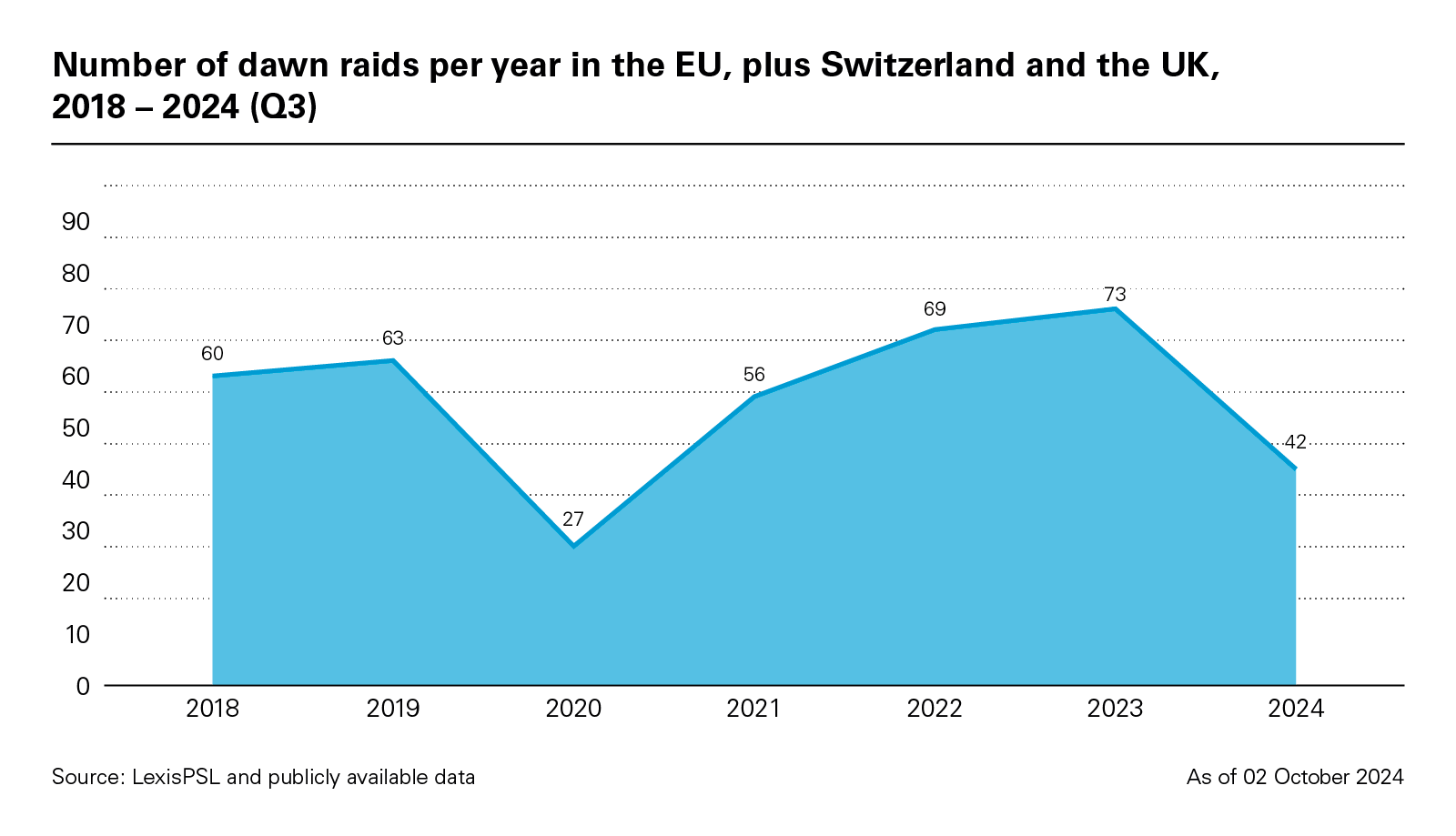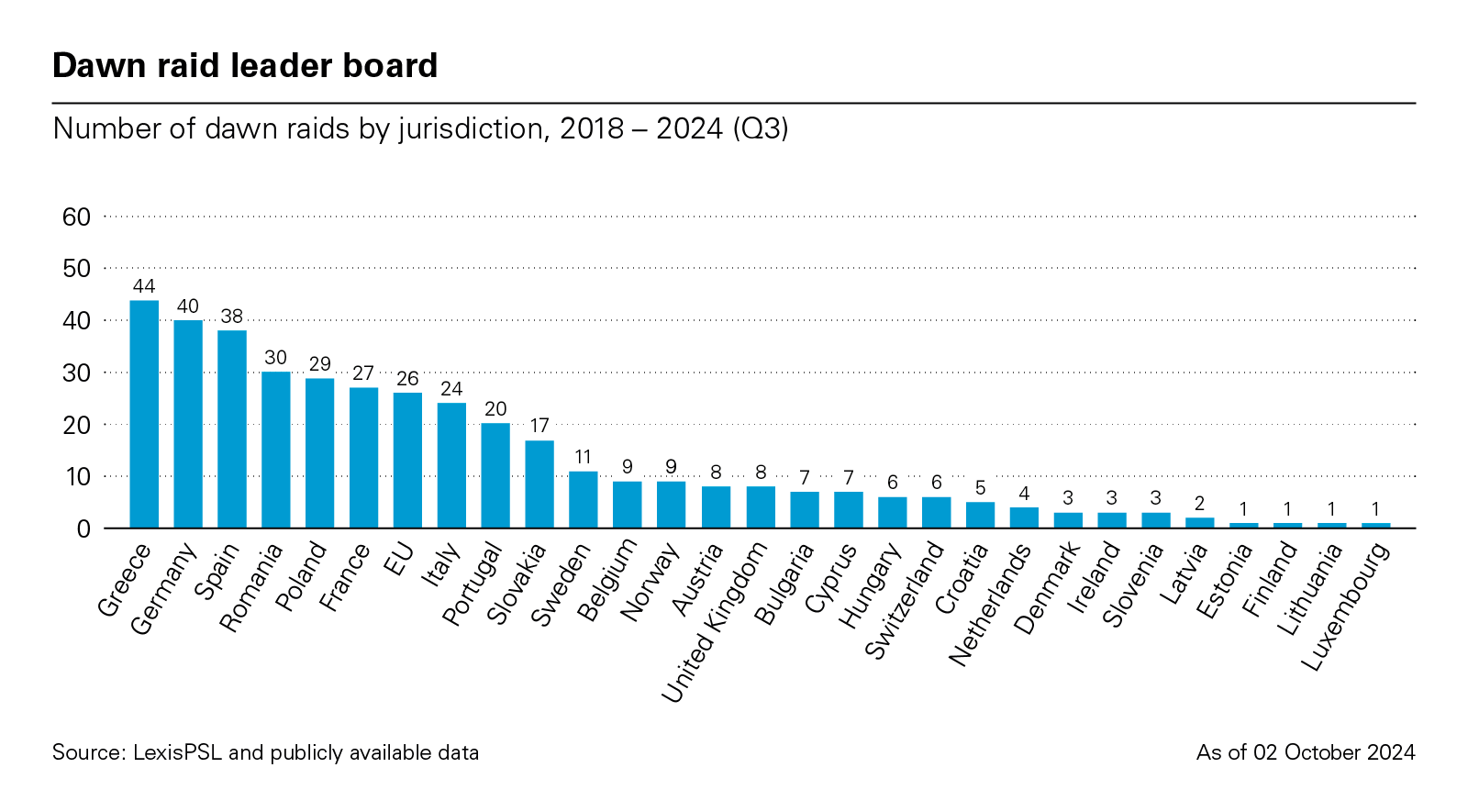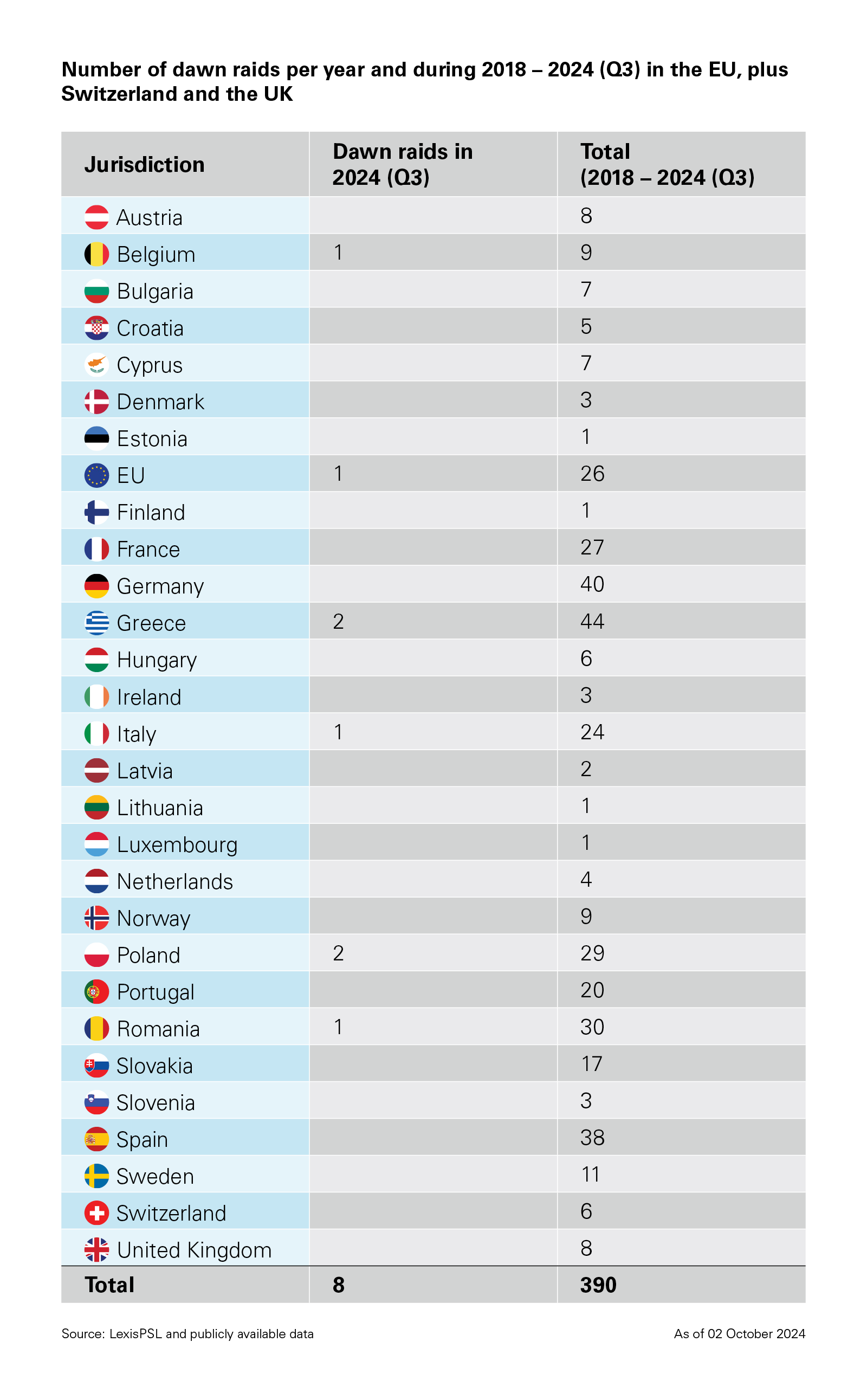Dawn Raid Analysis Quarterly
White & Case Dawn Raid Analysis Quarterly (DRAQ) is an information resource on surprise on-the-spot inspections (dawn raids) across Europe. Here we will guide you through the latest updates and legal developments.
The White & Case Dawn Raid Analysis Quarterly (DRAQ) is an information and discussion resource regarding surprise on-the-spot inspections by antitrust authorities (dawn raids) across Europe. DRAQ provides updates on recent case law, enforcement activity and trends.
Q3 2024 at a glance
In Q3 2024, European competition authorities carried out a total of eight dawn raids, four less than in the same period last year. The decrease may be due to the summer period which is typically quieter but also due to the fact that the Competition Commissioner's Margarete Vestager mandate is coming to its end – with the consequent focus on wrapping up ongoing cases rather than starting new ones.
The most active regulator in Q3 2024 were Polish and Greek competition authorities with two dawn raids each. The most targeted sector in Q3 was the transport sector.
Noteworthy for Q3:
- In September 2024, the European Commission raided offices of Nasdaq and Deutsche Börse in the financial derivatives sector. The dawn raid follows a series of raids by the European Commission in the financial sector in recent years.
- In September 2024, the European Commission President Ursula von der Leyen announced the list of Commissioner-designates for the new Commission. Spain's Vice Prime Minister Teresa Ribera is proposed to lead DG Competition. She will also oversee climate and competition policy as Executive Vice-President for a "clean, just and competitive transition." The Von Der Leyen's Mission Statement to Ribera includes a mission to "tackle anticompetitive practices, such as those which affect the competitiveness and sustainability of the food and farming sector". It remains to be seen to what extent this will be reflected in Ribera's enforcement priorities and whether the food and farming sector will become the target of more dawn raid activity. Additionally, Von Der Leyen is keen for Ribera to "vigorously enforce" the Foreign Subsidies Regulation and "take rapid and effective enforcement actions" under the Digital Markets Act. Both regulations allow for dawn raids. It will be interesting to see if Ribera will use the dawn raid powers under these regimes when she takes over. So far the European Commission used its FSR dawn raid powers just once – see more below.
- In September 2024, Hellenic Competition Authority (HCA) imposed a fine of EUR 9.2 million and EUR 50,000 on Motor Oil Hellas and a "natural person" respectively, for obstructing a dawn raid carried out by the authority at the company's premises. Although fining individuals in the context of antitrust dawn raids is unusual in Europe, the HCA is one of the European authorities which does so. Last year in September, HCA fined an individual €1 million for obstruction during a dawn raid. This fine is one of the highest-ever penalties imposed on an individual outside of the United States for obstruction of a dawn raid. Unlike the HCA, the European Commission does not have powers to fine individuals (a contrast which is obvious if we compare the outcome of the IFF case, also reported in this issue). It can fine undertakings or associations of undertakings a fixed fine of up to 1 per cent of the total turnover of the undertakings in the preceding business year, and/or a daily periodic penalty of up to 5 per cent of the average daily turnover of the undertaking.
We provide more statistics below on the number of raids and the sectors impacted, including a country-by-country list, available through our Interactive Dawn Raid map.
Key Q3 2024 legal developments
Below is a selection of key developments in Q3 2024:
- European Commission's powers to request data held outside the EU
- Potential reform of European Commission's dawn raid powers
- European Commission issues landmark fine for deletion of WhatsApp messages during a dawn raid
- Czech Competition Authority annuls fine for failure to cooperate during a dawn raid
European Commission's powers to request data held outside the EU
As reported in the Q2 2024 issue of the DRAQ, the European Commission (EC) conducted its first dawn raid under the EU Foreign Subsidy Regulation (FSR) in April 2024. The EC inspected the premises of Chinese security inspection equipment company, Nuctech, in the Netherlands and Poland. During the raid, the inspectors requested the content of the mailboxes of a number of employees (who were Chinese citizens), but were informed that this data was inaccessible as the data was stored on the parent company's servers in China. The inspectors requested Nuctech to place a legal hold on the relevant mailboxes. After the raid, the EC requested Nuctech to make the data available.
In addition to challenging the dawn raid decision, Nuctech applied for interim measures ordering the suspension of the dawn raid inspection decision, together with the legal hold requests and subsequent information request.
Nuctech argued inter alia that the EC unlawfully requested information located outside the EU and that the decision obliged Nuctech to breach Chinese criminal law. The President of the General Court rejected the request for interim proceedings, and noted the following:
- If the EC did not have the right to request information from companies located outside the EU, it would not be able to carry out investigations effectively and would jeopardise its ability to hold non-EU entities liable for conduct substantially affecting the EU. This situation could encourage entities established in the EU to store their data outside the EU to thwart EC investigations.
- Nuctech did not explain why they had no access to the requested data and did not explain how Chinese law could prevent them from responding to the EC request. Furthermore, Nuctech failed to explain how the relevant provisions of Chinese law applied to the requested information or that they had sought to obtain the necessary authorisations for the purposes of transferring it to the EC.
- Nuctech confined themselves to putting forward "in an extremely laconic manner" mere general assertions which made it impossible for the judge to assess whether the plea concerning access to the data concerned was prima facie well founded.
The question of whether the EU subsidiaries in this case could be compelled by the EC to provide the data held by its Chinese parent may be dealt with in greater detail by the General Court in the judgment on the appeal of the dawn raid decision when it is handed down, as well in the ruling on any appeal of the President of the General Court's rejection of the request for interim proceedings (if an appeal is lodged)
Potential reform of European Commission's dawn raid powers
On 5 September 2024, the European Commission (EC) published a Staff Working Document that summarizes the findings of its evaluation of the EU antitrust framework (Regulation 1/2003 and Regulation 773/2004). This includes a review of the current framework governing dawn raids. The document is backward-looking and does not make any proposals for reform. However, the points raised in the report provide an important source of inspiration for possible reform that may be instigated by the new EC.
The report summarises a number of stakeholder comments concerning the EC's current dawn raid practice, which include:
- Inspections are resource-intensive for the EC. In 2023, 15.6 FTE staff from DG Competition worked exclusively on inspections.
- Very few business records are stored at business premises, but rather are hosted in data centers or in cloud services. Company policies and data storage locations may compromise the efficiency of an inspection. There may be "challenges around legal barriers and issue of data sovereignty, for instance where information is kept on a server in a third country where the EC has no jurisdiction."
- The EC's sealing powers currently do not allow the preservation of digital evidence. The EC has to rely on the duty to actively cooperate and to make use of "litigation hold" functionalities. While many cloud computing solution offer the relevant functionalities, they are not always available.
- Dawn raids conducted at domestic premises are "intrusive", and "can be more sensitive as regards issues of fundamental rights and privacy". This may explain why the EC has only conducted inspections of non-business premises on 7 occasions, with the last inspection taking place in 2022.
- Provided companies instruct their home-working staff to bring to the business premises all devices and other digital carriers containing business records, a raid of domestic premises may not be necessary. With the advent of cloud computing, there is in principle little by way of evidence to be found at non-business premises that could not be received from a company's business premises.
European Commission issues landmark fine for deletion of WhatsApp messages during a dawn raid
In June 2024, the European Commission fined International Flavors & Fragrances (IFF) EUR 15,900,000 for the action of one employee who had deleted WhatsApp messages during a dawn raid.
In March 2023, the EC carried out a dawn raid at the premises of IFF. When one of the senior employees of IFF submitted his professional mobile phone for the inspection, the EC discovered that the custodian had deleted WhatsApp messages exchanged with a competitor after he was informed that he was subject of the inspection. It turned out that the messages were deleted during the dawn raid and they related to the subject matter of the investigation. After the EC challenged the employee about the deletion, IFF immediately admitted its liability and helped the EC to timely restore the deleted information.
The EC can impose fines up to 1% of the total turnover of companies for obstructing a dawn raid. When setting the fine, the EC took the cooperation into the account and lowered the fine from 0.30% of IFF's turnover to 0.15% of IFF's turnover.
The EC's fining decision illustrates the importance of making company employees aware that inspectors can search messages exchanged via social media platforms, detect when messages have been deleted from devices, and impose significant fines for obstruction in the cases of deletion.
Czech Competition Authority annuls fine for failure to cooperate during a dawn raid
In March 2023, the Czech Competition Authority (CCA) conducted a dawn raid on the premises of household appliances wholesaler Beko. During the dawn raid, the company did not block its external sales representatives from accessing their email accounts on the beco.com domain, even though it should have done in order to prevent interference with the accounts. The company also did not provide the CCA with access to one of these email accounts. As a result, the CCA imposed on Beko a fine of CZK 13, 651,000 (approximately EUR 540, 000) for failing to cooperate with the inspectors.
While the inspectors had asked the company to make the email accounts of its external sales representatives accessible to the CCA, they did not make clear that Beko should also implement necessary measures to prevent manipulation with the accounts. Although the inspectors requested access to one particular email account, they did not insist further after the company refused. In that regard, the inspectors did not communicate to the company the negative consequences for failing to cooperate i.e., to provide the access to the email account. To the contrary, as per the inspectors' instruction, the email account of the external sales representative was unblocked without further action. According to the chairman of the CCA, the company thus had a legitimate reason to doubt the necessity of the inspectors' request. As a result of the above, the chairman of the CCA (following an internal CCA appeal procedure challenging the fine) annulled the fine.
This decision does not change the position of the CCA, which considers a dawn raid obstruction a serious offense. If dawn raided companies fail to cooperate with inspectors, they can expect a fine at the maximum rate of 1% of turnover or CZK 300,000. The Beko fine was quashed on procedural and due process grounds in this particular case, where inspectors' instructions were not clear enough.
This article is prepared for the general information of interested persons. It is not, and does not attempt to be, comprehensive in nature. Due to the general nature of its content, it should not be regarded as legal advice."
Interactive Dawn Raid map
Hover over the highlighted countries to get a closer look at the enforcement activity of the respective National Competition Authorities since 2021.
Austria2024
2023
2022
2021
Belgium2024
2023
2022
2021
Bulgaria2024
2023
2022
2021
Croatia2024
2023
2022
2021
Cyprus2023
2022
2021
Czech RepublicDenmark2023
2022
2021
Estonia
Finland2024
2023
2022
2021
France2024
2023
2022
2021
Germany2024
2023
2022
2021
Greece2024
2023
2022
2021
Hungary2023
2022
2021
Ireland2024
2023
2022
2021
Italy2024
2023
2022
2021
Latvia
Lithuania
Luxembourg2024
2023
2022
2021
Netherlands2023
2022
2021
Norway2023
2022
2021
Poland2024
2023
2022
2021
Portugal2024
2023
2022
2021
Romania2024
2023
2022
2021
Slovakia2024
2023
2022
2021
Slovenia2024
2023
2022
2021
Spain2024
2023
2022
2021
Sweden2023
2022
2021
Switzerland2024
2023
2022
2021
United Kingdom2023
2022
2021
EU2024
2023
2022
2021
|
A look at the statistics
Read our White & Case Global Antitrust Merger StatPak (WAMS) Reports
The information below has been sourced from LexisPSL, and is based on dawn raids that have been publicly announced by competition authorities. The LexisPSL information was supplemented from selected public sources in jurisdictions where further information was available. Since not all competition authorities announce every dawn raid, the data below likely underestimate the number of raids. The sector charts reflect dawn raids in which the sectors were identified by the competent authorities. In some jurisdictions (e.g., Germany), the authority publishes the number of raids without identifying the sector. As a result, the statistics in the charts below may underestimate the actual number of dawn raids by sector and country. Additionally, we do not disclose the number of dawn raids in certain jurisdictions, where we are aware that total numbers may be distorted due to the basis on which the numbers are reported in that jurisdiction (e.g., in the Czech Republic).
Read our White & Case Global Antitrust Merger StatPak (WAMS) Reports
White & Case means the international legal practice comprising White & Case LLP, a New York State registered limited liability partnership, White & Case LLP, a limited liability partnership incorporated under English law and all other affiliated partnerships, companies and entities.
This article is prepared for the general information of interested persons. It is not, and does not attempt to be, comprehensive in nature. Due to the general nature of its content, it should not be regarded as legal advice.
White & Case antitrust publications

 View full image: Number of dawn raids per year in the EU plus Switzerland and the UK, 2018 – 2024 (Q3) (PDF)
View full image: Number of dawn raids per year in the EU plus Switzerland and the UK, 2018 – 2024 (Q3) (PDF)
 View full image: Dawn raid leader board (PDF)
View full image: Dawn raid leader board (PDF)
 View full image: Number of dawn raids per year and during 2018 – 2024 (Q3) in the EU plus Switzerland and the UK (PDF)
View full image: Number of dawn raids per year and during 2018 – 2024 (Q3) in the EU plus Switzerland and the UK (PDF)



